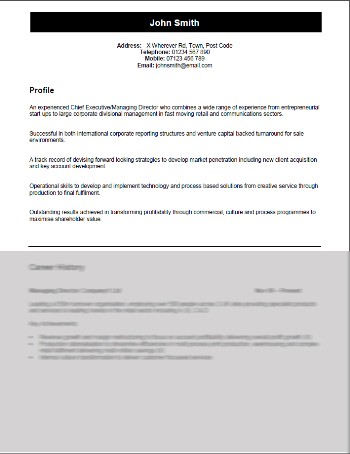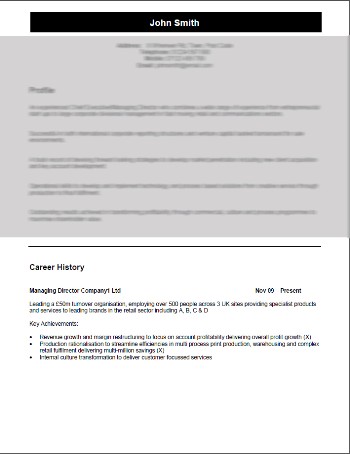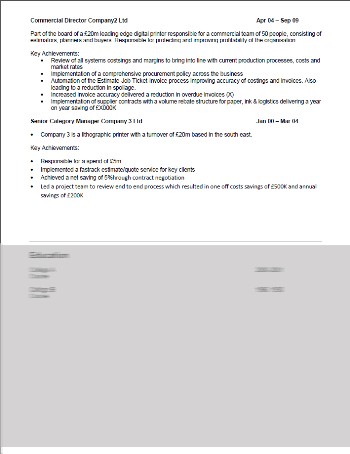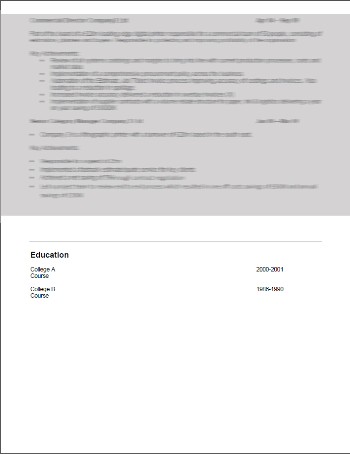Since your CV creates the first impression for a potential employer, it's really important that you give yourself the best possible chance in what are usually very competitive markets. This means that you must sell your previous experience and current skill set whilst ensuring that the layout, grammar and spelling are absolutely correct.
Before you start writing your CV, list in chronological order each of the roles you have ever held and everything you have achieved and learnt within these roles. Think through tasks you excelled in and those that disappointed. Spend a little time considering these outcomes and then make a list of your strengths. It you have any out of work activities that you believe have contributed to your skill and knowledge base add these to the list. You will not use all of this information in your CV but it does help to catalogue your wide skill base. You are now ready to start writing your CV. Below are guideline notes to help you develop this important marketing tool.
Basic CVStructure (Download CV Template)
Name, Address and Contact Details (you do not need to add your age, marital status, number of children, or favourite holiday locations!)
Include your phone number and email address.
Profile:
This is an opportunity to summarise your career and to explain the unique sales proposition that you might bring to a future employer and the type of role you are looking for. Do not be arrogant and do not oversell.
Include skills to attract the attention of someone short-listing.
Highlight a list of skills and experiences you possess with particular reference to the role advertised (this is not the list you prepared above but a subset specifically tailored to the job in question).
When referring to skills try to use adjectives similar to those listed in the job description or advertisement.
Do not just repeat what you have put in your cover letter.
Example
This should include the dates between which you worked, starting with the last role and including the employer and some statement on the size and scope of the organization you work for plus your key achievements.
Employers look for the impact of your actions rather than simple descriptions of tasks undertaken. Wherever possible, back up achievements with facts and figures.
Example
Usually start with your highest level of qualification but also include any specialist training that you have received. Most people are not impressed with your GCSE results.
References:
There is no need to include references on your CV, but you may wish to put 'references available on request'.
Example
Presentation and layout
It is critical that you CV is well laid out. Use a simple font (Arial and a suitable size (10 to 12) and limit italics and underlining).
It's really important that there are no spelling or punctuation mistakes. Always use a spell checker. Whilst it may seem trivial, a small mistake indicates a lack of attention to detail and might jeopardise your application.
Making your CV Relevant
Do not become complacent with a single CV. Adapt each CV to each job description.
Read the advertisement and job description carefully. Analyse the wording and translate it into real activities and then make sure within your CV, skill and job history, you include statements that indicate you fulfil the employer's requirements.
Make sure that you have reviewed the organisation's website and Googled them. Look at their press releases, annual report and customers wherever possible so that you have a complete understanding of their own vision and values and the challenges they face. It also helps to look at their competitors and compare the differences. Adapt your CV to mirror the culture of the organisation.
The objective of your CV is for them to want to interview you, make sure you neither bombard them with information nor bore them. Your CV should be no longer than 2 pages.
Remember this is your primary selling document.

- Cover Letter Techniques A good, detailed and specific covering letter can be the perfect tool to get your CV noticed amongst the masses.
- Interview Techniques There are a number of popular styles of interview that include specific prepared questions and answers, but more and more interviews are what is described as competency based.
- Useful Articles Useful Articles.














